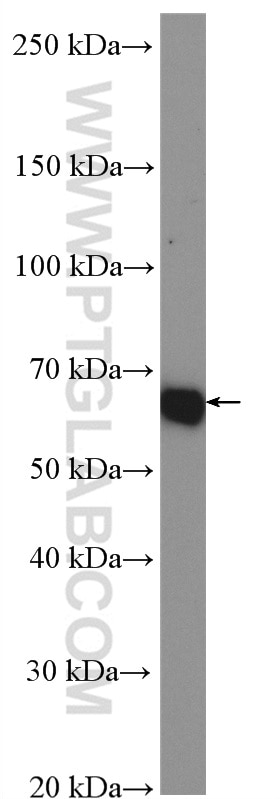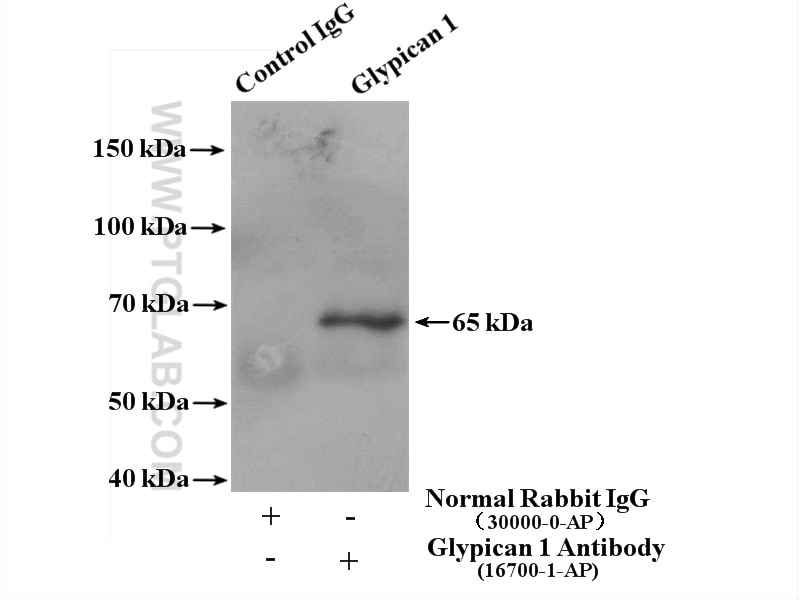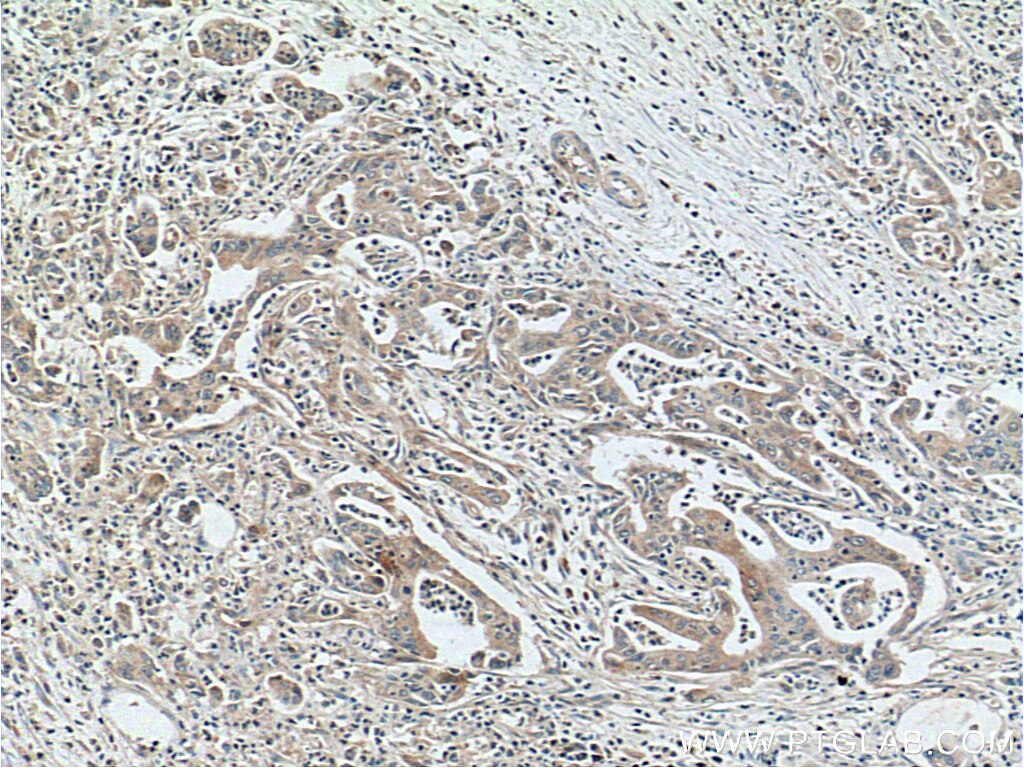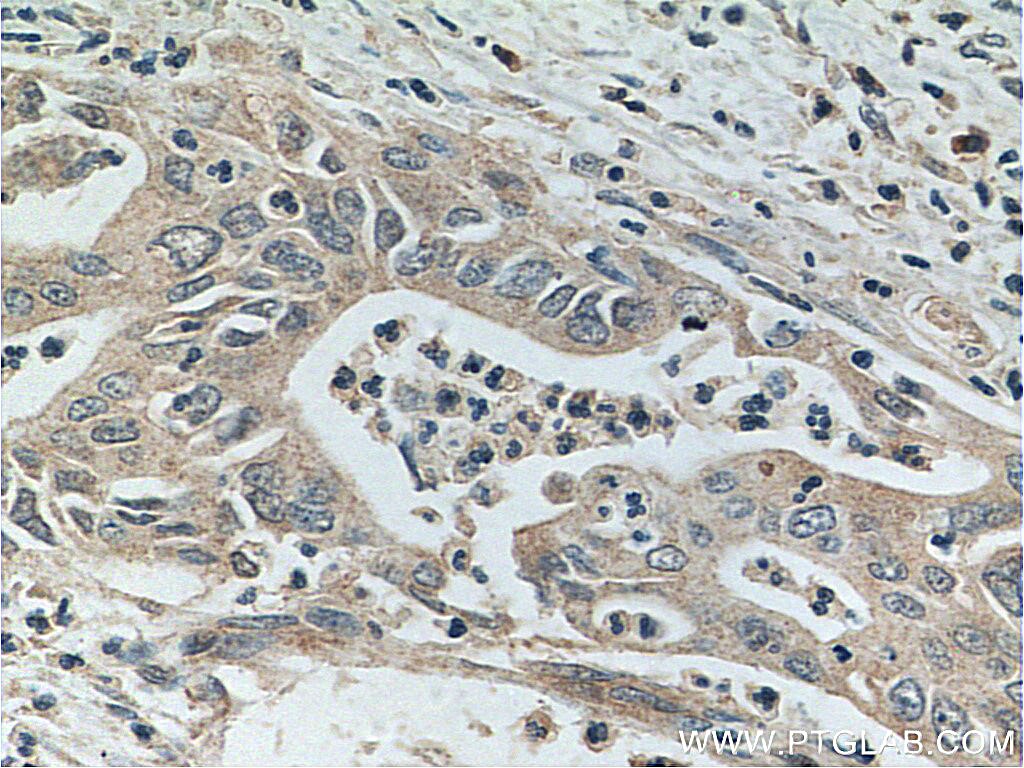Tested Applications
| Positive WB detected in | HepG2 cells |
| Positive IP detected in | BxPC-3 cells |
| Positive IHC detected in | human pancreas cancer tissue Note: suggested antigen retrieval with TE buffer pH 9.0; (*) Alternatively, antigen retrieval may be performed with citrate buffer pH 6.0 |
Recommended dilution
| Application | Dilution |
|---|---|
| Western Blot (WB) | WB : 1:500-1:1000 |
| Immunoprecipitation (IP) | IP : 0.5-4.0 ug for 1.0-3.0 mg of total protein lysate |
| Immunohistochemistry (IHC) | IHC : 1:50-1:500 |
| It is recommended that this reagent should be titrated in each testing system to obtain optimal results. | |
| Sample-dependent, Check data in validation data gallery. | |
Published Applications
| KD/KO | See 2 publications below |
| WB | See 12 publications below |
| IHC | See 10 publications below |
| IF | See 2 publications below |
| CoIP | See 1 publications below |
Product Information
16700-1-AP targets Glypican 1 in WB, IHC, IF, IP, CoIP, ELISA applications and shows reactivity with human, mouse, rat samples.
| Tested Reactivity | human, mouse, rat |
| Cited Reactivity | human, mouse |
| Host / Isotype | Rabbit / IgG |
| Class | Polyclonal |
| Type | Antibody |
| Immunogen |
CatNo: Ag10095 Product name: Recombinant human GPC1 protein Source: e coli.-derived, PGEX-4T Tag: GST Domain: 208-558 aa of BC051279 Sequence: ELRLRATRAFVAARSFVQGLGVASDVVRKVAQVPLGPECSRAVMKLVYCAHCLGVPGARPCPDYCRNVLKGCLANQADLDAEWRNLLDSMVLITDKFWGTSGVESVIGSVHTWLAEAINALQDNRDTLTAKVIQGCGNPKVNPQGPGPEEKRRRGKLAPRERPPSGTLEKLVSEAKAQLRDVQDFWISLPGTLCSEKMALSTASDDRCWNGMARGRYLPEVMGDGLANQINNPEVEVDITKPDMTIRQQIMQLKIMTNRLRSAYNGNDVDFQDASDDGSGSGSGDGCLDDLCGRKVSRKSSSSRTPLTHALPGLSEQEGQKTSAASCPQPPTFLLPLLLFLALTVARPRWR Predict reactive species |
| Full Name | glypican 1 |
| Calculated Molecular Weight | 558 aa, 62 kDa |
| Observed Molecular Weight | 65 kDa |
| GenBank Accession Number | BC051279 |
| Gene Symbol | GPC1 |
| Gene ID (NCBI) | 2817 |
| RRID | AB_1851168 |
| Conjugate | Unconjugated |
| Form | Liquid |
| Purification Method | Antigen affinity purification |
| UNIPROT ID | P35052 |
| Storage Buffer | PBS with 0.02% sodium azide and 50% glycerol, pH 7.3. |
| Storage Conditions | Store at -20°C. Stable for one year after shipment. Aliquoting is unnecessary for -20oC storage. 20ul sizes contain 0.1% BSA. |
Background Information
Glypicans are a family of HSPGs that are attached to the cell membrane by a glycosyl-phosphatidylinositol anchor. Glypicans are considered to have the ability to modulate the activities of HBGFs. The expression of glypicans is regulated temporally and spatially during development, suggesting they are involved in development and morphogenesis. To date, six glypicans (GPC1 to GPC6) have been identified in mammals. GPC1 is most ubiquitously expressed in adult tissues. GPC1 promotes efficient signaling by HBGFs and plays a critical role in cell growth and differentiation. GPC1 is involved in tumorigenesis and angiogenesis, and is frequently overexpressed in several types of tumors including pancreatic carcinoma, breast cancer and glioma.
Protocols
| Product Specific Protocols | |
|---|---|
| IHC protocol for Glypican 1 antibody 16700-1-AP | Download protocol |
| IP protocol for Glypican 1 antibody 16700-1-AP | Download protocol |
| WB protocol for Glypican 1 antibody 16700-1-AP | Download protocol |
| Standard Protocols | |
|---|---|
| Click here to view our Standard Protocols |
Publications
| Species | Application | Title |
|---|---|---|
Nat Commun Decoding non-canonical mRNA decay by the endoplasmic-reticulum stress sensor IRE1α | ||
Matrix Biol miR-324-5p is up regulated in end-stage osteoarthritis and regulates Indian Hedgehog signalling by differing mechanisms in human and mouse.
| ||
Mod Pathol Glypican-1 immunohistochemistry does not separate mesothelioma from pulmonary adenocarcinoma. | ||
Mod Pathol Glypican-1 immunohistochemistry is a novel marker to differentiate epithelioid mesothelioma from lung adenocarcinoma. | ||
Front Cell Dev Biol The Glypican-1/HGF/C-Met and Glypican-1/VEGF/VEGFR2 Ternary Complexes Regulate Hair Follicle Angiogenesis. | ||
Transl Lung Cancer Res Glypican-1 is a novel immunohistochemical marker to differentiate poorly differentiated squamous cell carcinoma from solid predominant adenocarcinoma of the lung. |
Reviews
The reviews below have been submitted by verified Proteintech customers who received an incentive for providing their feedback.
FH Vishwa Jeet (Verified Customer) (11-09-2017) | Recently, our publication has been accepted in Modern Pathology.
|










